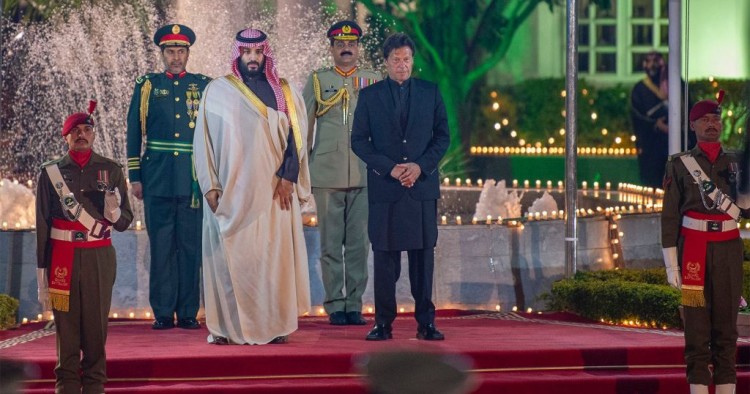The Sept. 14 attack on Saudi Arabia’s Abqaiq oil processing plant has put Pakistan in a place it never wanted to be: possibly forced to choose between Saudi Arabia and Iran. The intensifying rivalry between these Gulf powers is challenging Pakistan’s efforts to maintain a roughly balanced foreign policy. Over four decades Islamabad governments have succeeded remarkably in navigating between the two countries, retaining close spiritual, economic, and military links with Saudi Arabia while holding to a normal, sometimes delicate relationship with neighboring Iran. Pakistan’s balancing act, if necessarily somewhat tilted toward Saudi Arabia, has been made possible because neither the Saudis nor the Iranians have insisted that ties to the other had to be severed as a condition of their friendship.
In a visit to Saudi Arabia on Sept. 19, Pakistani Prime Minister Imran Khan condemned the strike on the oil facilities. In meetings with Saudi King Salman and Crown Prince Mohammed bin Salman, Khan proclaimed that Pakistan stands with the kingdom “in the event of a threat to its sanctity and security.” But conspicuously absent in the prime minister’s reported remarks was any reference to Iran, which Saudi Arabia accuses of launching the attack. In return for the Pakistani pledge, the Saudi king reiterated an also familiar refrain of solidarity with Pakistan on the Kashmir issue.
Both countries’ assurances are less that meets the eye, however. Saudi Arabia has never pressured India on the Kashmir issue. For all that the kingdom values its bonds with Pakistan, it remains determined not to jeopardize its solid economic ties with India. For its part, Pakistan with its refusal in 2014 to participate militarily in the Saudi-led alliance in Yemen has demonstrated that it had no interest in a commitment that could, even if indirectly, put the country into conflict with Iran. Nor does Pakistan have any desire to become involved in the current standoff between the two Gulf countries.
But that said, last year an ever beholden Pakistan, faced with economic collapse, went begging to the Saudi crown prince for cash and came away with a critical $6 billion. Meanwhile, Islamabad feels pressed to distance itself from Iran by a Saudi-friendly American administration. An Afghanistan that fractures politically could find Pakistani and Iranian proxies pitted against one another. For the time being, Pakistan will no doubt try to continue with a foreign policy that balances Saudi Arabia and Iran, but likely with diminishing success.
Marvin G. Weinbaum is the Director of MEI's Afghanistan and Pakistan Studies program.
Photo by Bandar Algaloud/Saudi Kingdom Council /Handout/Anadolu Agency/Getty Images
The Middle East Institute (MEI) is an independent, non-partisan, non-for-profit, educational organization. It does not engage in advocacy and its scholars’ opinions are their own. MEI welcomes financial donations, but retains sole editorial control over its work and its publications reflect only the authors’ views. For a listing of MEI donors, please click here.













